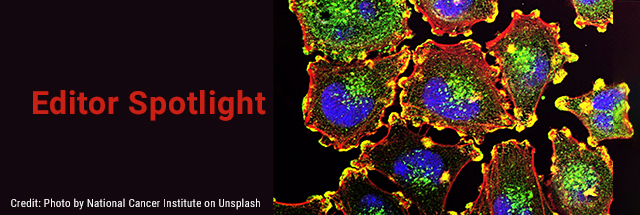
| ||||

|
||||
|
Editor Spotlight
Website: https://www.petermac.org/research/labs/ricky-johnstone Twitter: @JohnstoneRicky Meet the Team
• Rob Bristow, MD, PhD (The University of Manchester), https://www.research.manchester.ac.uk/portal/robert.bristow.html Publish With Us Our editorial team is excited to evaluate papers that study the genetic, epigenetic, biological and biochemical events that underpin cancer onset and progression. This includes hypothesis-driven fundamental science focused on knowledge creation and pre-clinical studies that extend important discoveries. We are interested in studies that challenge existing dogma and provide paradigm-shifting insight into cancer causes, development and target-based treatment. Interested in talking more about cancer at Science Advances? Meet Ari and Sheng at the 2022 AACR Annual Meeting in New Orleans! Submit your paper today for publication consideration in Science Advances.Learn more on how to submit a manuscript today, here. For further inquiries, please contact the Science Advances Editorial Office at ScienceAdvancesEditorial@aaas.org. About Science Advances Science Advances is the gold, open-access, multidisciplinary expansion of the journal Science. Led by a large board of active, prominent researchers, Science Advances publishes work across all areas of science, highlighting both broad impact and disciplinary-specific breakthroughs. Our editors strive to provide authors with fair, fast, expert peer review and readers with free access to ground-breaking advancements in science across all disciplines. As a high caliber, open-access journal, Science Advances is committed to the mission of its publisher, the American Association for the Advancement of Science (AAAS), the not-for-profit organization dedicated to advancing science, engineering, and innovation throughout the world for the benefit of all people. Learn more>> Like us on Facebook @ScienceAdvances | Follow us on Twitter @ScienceAdvances |
||||
|
 Ricky Johnstone, PhD is an internationally renowned cancer researcher who has utilized genetic mouse models of hemopoietic malignancies and solid tumors to understand the epigenetic and transcriptional changes that underpin tumor onset and progression. He has also used these models to develop new therapies that target epigenetic and transcriptional regulatory proteins. Johnstone recently discovered how epigenetic based-agents can engage the host immune system to drive prolonged therapeutic responses. He directs the Gene Regulation Laboratory at the Peter MacCallum Centre and leads The Sir Peter MacCallum Department of Oncology at the University of Melbourne. Johnstone received his doctorate from the University of Melbourne in 1993 and after a postdoc at Harvard Medical School returned to Melbourne to establish the Gene Regulation Laboratory at the Peter MacCallum Cancer Centre in 2000. He is the executive director of Cancer Research at the Peter MacCallum Cancer Centre. Johnstone has published more than 245 peer-reviewed papers, was awarded an NHMRC Senior Principal Research Fellowship in 2015, and in 2011 was promoted to full professor in the Department of Pathology at the University of Melbourne.
Ricky Johnstone, PhD is an internationally renowned cancer researcher who has utilized genetic mouse models of hemopoietic malignancies and solid tumors to understand the epigenetic and transcriptional changes that underpin tumor onset and progression. He has also used these models to develop new therapies that target epigenetic and transcriptional regulatory proteins. Johnstone recently discovered how epigenetic based-agents can engage the host immune system to drive prolonged therapeutic responses. He directs the Gene Regulation Laboratory at the Peter MacCallum Centre and leads The Sir Peter MacCallum Department of Oncology at the University of Melbourne. Johnstone received his doctorate from the University of Melbourne in 1993 and after a postdoc at Harvard Medical School returned to Melbourne to establish the Gene Regulation Laboratory at the Peter MacCallum Cancer Centre in 2000. He is the executive director of Cancer Research at the Peter MacCallum Cancer Centre. Johnstone has published more than 245 peer-reviewed papers, was awarded an NHMRC Senior Principal Research Fellowship in 2015, and in 2011 was promoted to full professor in the Department of Pathology at the University of Melbourne.